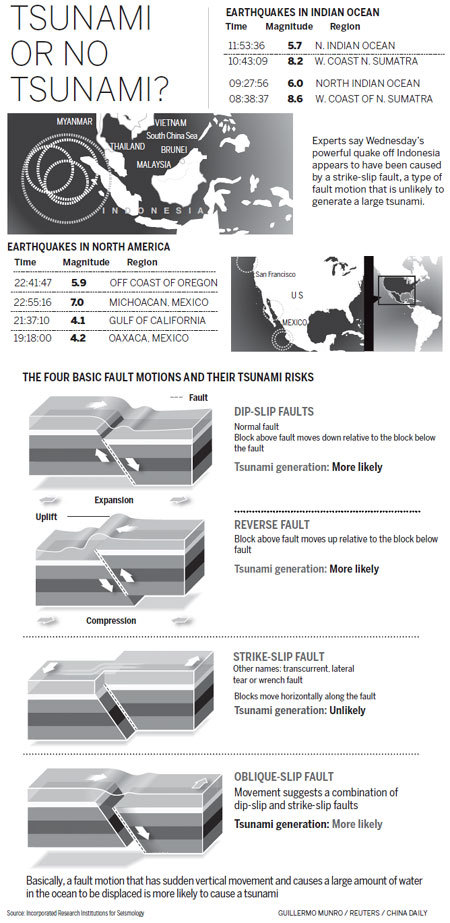Tsunami alert systems effective
Updated: 2012-04-13 07:03
(China Daily)
|
|||||||||||
Giant quakes off Indonesia in which five people died caused panic but little damage, with warning systems introduced after the catastrophic 2004 Asian tsunami proving successful, experts said on Thursday.

In the tense hours that an Indian Ocean-wide tsunami watch remained in effect on Wednesday, Indonesian meteorologists were monitoring offshore buoys that measured the waves, confidently predicting that the likelihood of a large tsunami was minimal.
The use of smartphones and social media has risen to the fore across Asia since 2004, which helped to spread the word on Wednesday across other affected nations such as Thailand and India.
"The early warning system is working well," Indonesian President Susilo Bambang Yudhoyono reassured the nation in a televised address on Wednesday. "So far, there is no tsunami threat."
At a magnitude of 8.6, the first of the two quakes which hit on Wednesday was the 10th strongest recorded in the past 100 years - all the others produced deadly tsunamis.
Indonesian authorities said five people died as the quakes struck, two from heart attacks and three of shock. At least another seven were injured, including a child in critical condition after falling from a tree.
Indonesia launched a $130-million tsunami warning system in November 2008 in a bid to prevent a repeat of tragedies like the 2004 disaster, which killed around 170,000 people in the archipelago nation alone.
On Thursday, life in Indonesia's Aceh province, which was nearly flattened in 2004, was returning to normal, with traffic in the streets and no visible signs of damage in the capital.
Shops in Banda Aceh were open, most people were back at work and farmers were in their fields. Electricity was also back on, though schools were empty as parents appeared too fearful to send children to classes.
Officials said Aceh was spared this time because the epicenter of Wednesday's quake was much farther offshore than the 2004 quake. Suharjono, head of the earthquakes department at Indonesia's Meteorology and Geophysics Agency, said authorities had known a tsunami could hit 50 minutes after Wednesday's quake.
"We also knew which parts of the coast to watch," he said, explaining that offshore buoys send signals to monitoring stations in Indonesia and beyond.
James Goff, director of the Australia-Pacific Tsunami Research Center at the University of New South Wales, said the alert was a "decent test" of the Indian Ocean tsunami warning system, an ambitious network of tidal gauges, deep ocean buoys and seismic monitors completed after 2004. Wednesday's quake was felt as far afield as Thailand, India, Indonesia, Kenya, Malaysia, Reunion Island, Sri Lanka, and Myanmar.
KFC Thailand has issued an apology after being criticized for a Facebook message that urged people to rush home during Wednesday's tsunami scare and order a bucket of KFC chicken.
The company posted this message: "Let's hurry home and follow the earthquake news. And don't forget to order your favorite KFC menu."
It prompted hundreds of angry comments on a variety of Thai websites that denounced the company as insensitive and selfish.
On Thursday, two large earthquakes struck western Mexico, shaking buildings as far away as the capital and sending people rushing out of offices onto the streets, the US Geological Survey said.
There were no reports of major damage after the first of the two tremors.
The USGS said the first quake on Wednesday evening in the western state of Michoacan had a magnitude of 6.5 - and was recorded at a depth of 20 kilometers.
The second quake, in the early hours of Thursday off Baja California, was stronger at a magnitude of 6.9 and shallower at a depth of 10 km.
Mexico City Mayor Marcelo Ebrard, writing on his Twitter account after the first quake, said there were no initial signs of serious damage. Key services in the capital, including its subway system and the international airport, were operating normally.
AFP-AP-Reuters
Today's Top News
President Xi confident in recovery from quake
H7N9 update: 104 cases, 21 deaths
Telecom workers restore links
Coal mine blast kills 18 in Jilin
Intl scholarship puts China on the map
More bird flu patients discharged
Gold loses sheen, but still a safe bet
US 'turns blind eye to human rights'
Hot Topics
Lunar probe , China growth forecasts, Emission rules get tougher, China seen through 'colored lens', International board,
Editor's Picks

|

|

|

|

|

|





